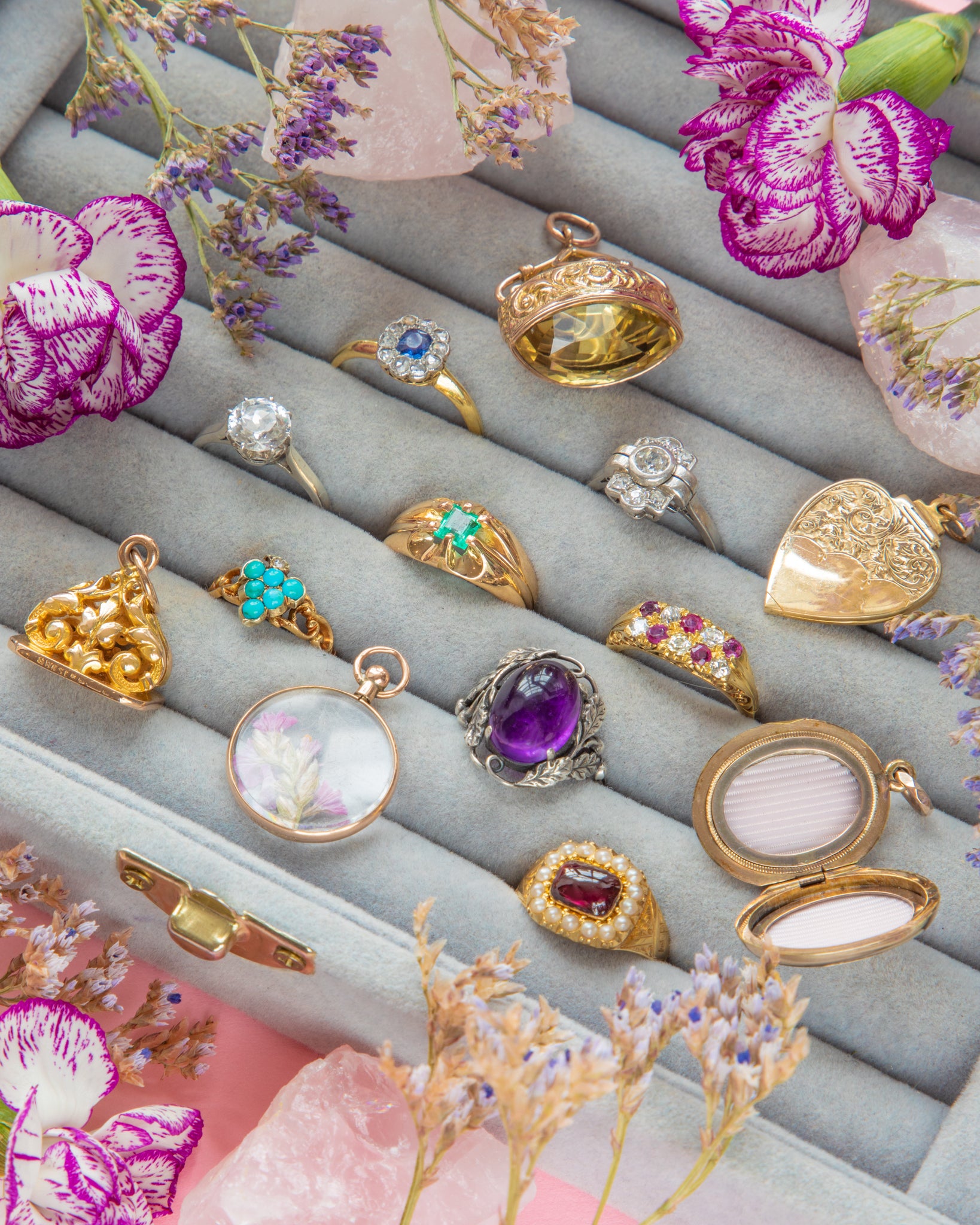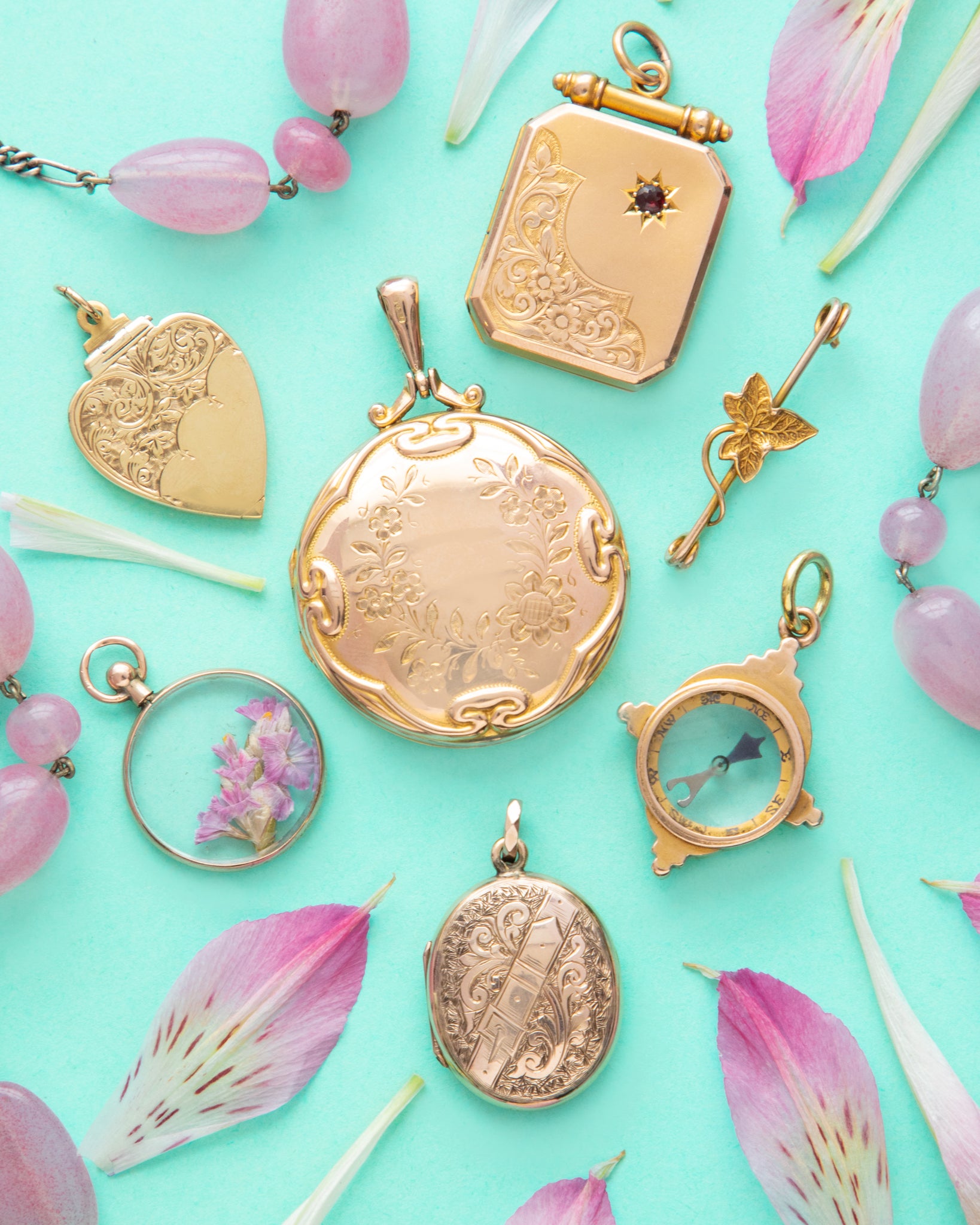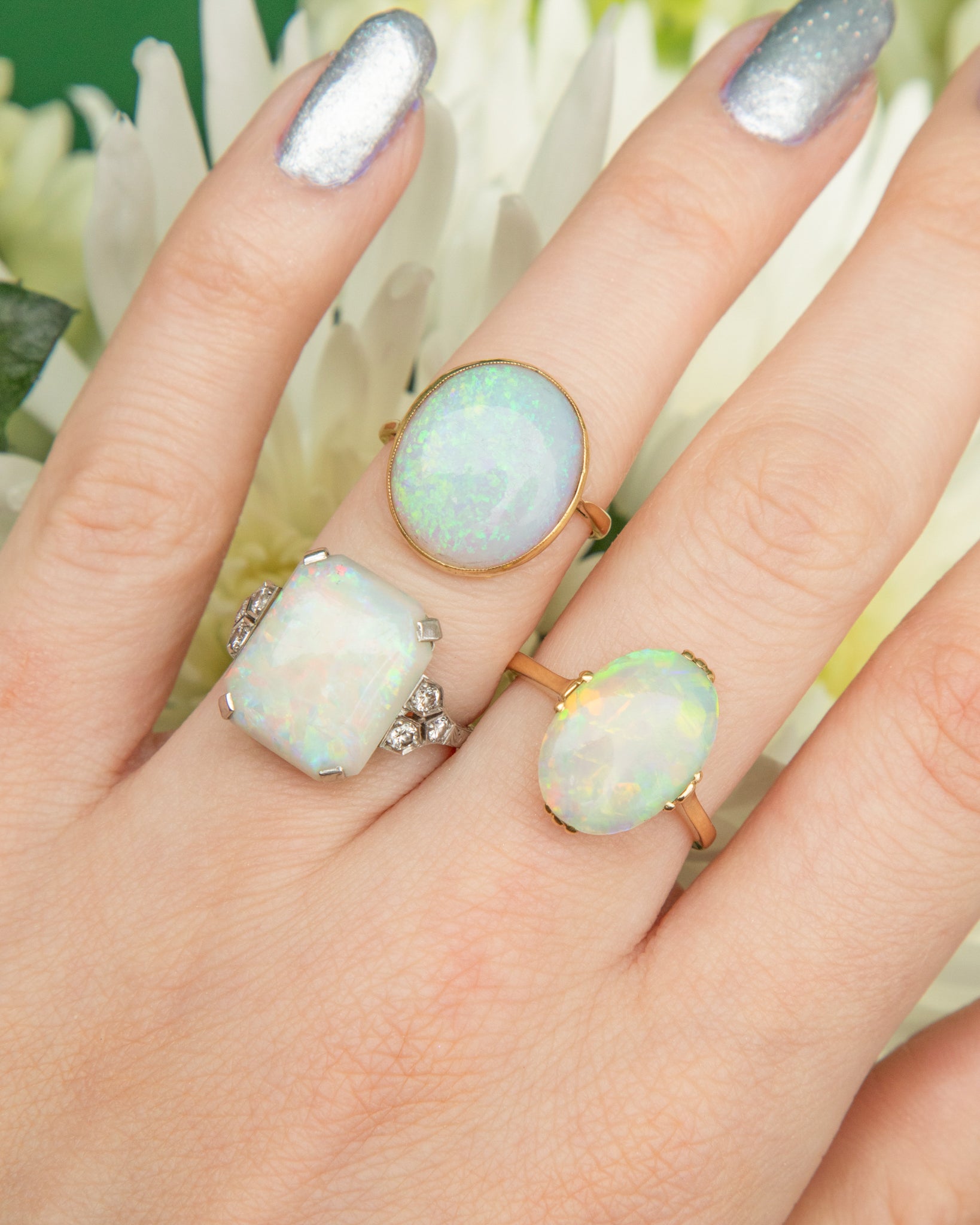It’s one thing finding the right antique necklace or Art Deco cluster ring, but it’s something else entirely making sure you look after them. Just like freshly made jewels, antique jewellery needs to be cleaned and looked after with the utmost care. After all, they are hundreds of years old, and worth every penny.
We get asked all the time how to clean your jewels - can antique jewellery get mechanically cleaned? What is the best way to clean an Emerald ring? Will I ruin my jewels if I get them wet?
So, we have compiled all of our years of jewellery experience to give you a definitive guide on cleaning antique jewellery.

Every Single Jewel is Different.
This won’t be surprising to hear, but every single jewel needs to be treated differently and with care. For antique jewels, you could be dealing with a variety of eras, and don’t get us started on the different metals and gemstones.
We largely sell pieces that are solid Gold and solid Silver, but in some cases we can also sell Gold Cased, Rolled Gold, Gold Gilt and “Garnet Gold” pieces. Most solid metals can be cleaned with ease, but that doesn’t mean you should treat them carelessly. It is very natural for Gold and Silver, no matter whether they are solid or cased, to change colour as its worn. This is called a “Patina” which is essentially natural oxidisation. Gold and Silver will not only change colour from the chemicals we interact with day to day (cleaning products, makeup, perfume, moisturiser) but also our skins innate natural chemicals. If you own quite a few antique jewels, we recommend investing in specialist Gold and Silver cleaners as well as having a few polishing cloths handy for when you want to give them a little touch up before an event.

However, when considering how a jewel needs to be cleaned, there are a few things to keep in mind:
- What is the structure of your piece - is it an Art Deco solitaire ring with a high profile setting or is it a Victorian Gyspy Set Diamond band?
- What are the materials - what is the carat of the Gold, what gemstones (if any) are included and are these gemstones treated?
- How old is the piece?
- Are the gemstones well-set?
- When was it last cleaned?
All of these varying factors will depend on how a jewel is cleaned. It can be really easy to overlook jewellery, as it is a solid sturdy piece and unlike clothes or other softer objects, won’t be able to break with ease. However, many jewellery materials are softer than you may think, including gemstones. Even something as sensitive as temperature changes can cause gemstones like Emeralds and Opals to crack or even break apart entirely, which is why it is vital to treat them differently and, of course, with care.

Generally speaking, most jewels can be cleaned in mild soapy warm water with a soft bristled toothbrush, except for porous gemstones. However, it’s really important to check how these gemstones are set. Closed back settings, where a metal is entirely covering the back of the gemstone, shouldn’t get wet at all (even if the gemstones and metals are structurally sound), this is because it could damage the foils (if they are foiled) and the water particles would get trapped creating condensation, damp and ultimately damaging the both the gem and metal.
Gemstones to Clean and Not Clean in Mild Soapy Water
To make it easier for you, here are the gemstones you can clean in mild soapy warm water:
- Amethyst
- Aquamarine
- Citrine
- Diamond
- Emerald
- Garnet
- Heliodor
- Ivory
- Jade
- Kunzite
- Opal
- Peridot
- Lapis Lazuli
- Moonstone
- Ruby
- Sapphire
- Spinel
- Tanzanite
- Topaz
- Tourmaline
- Zircon
Make sure to use a soft bristled brush when cleaning these jewels (a soft toothbrush will do!). Even though some of these gems are harder than others, they can still be susceptible to scratches, which is why we recommend you clean them one at a time.

And, here are the gemstones you should avoid cleaning in warm water
- Amber
- Carnelian
- Coral
- Malachite
- Pearl
- Turquoise
For Amber, Carnelian, Coral, Pearl and Turquoise you should just clean with a damp moist cloth and then dry immediately with a dry cloth. For Malachite, only clean in cold water with a mild soap.

Gemstones That Can Be Mechanically Cleaned
What is mechanical jewellery cleaning?
The most common mechanical gemstone cleaner is an ultrasonic cleaner. There are a range of ones you can buy for home use, but we recommend that if you want a piece mechanically cleaned, you take it to a professional jeweller.

Ultrasonic cleaners are essentially a bath where millions of microscopic frequency waves bounce off the jewels, loosening dirt and grime. Whilst this sounds like a great idea, most gemstones shouldn’t be ultrasonic cleaned. This is because it’s a high pressure zone that can aggravate any unseen inclusions and even cause gemstones to break apart.
These are the gemstones that can be ultrasonic cleaned:
- Alexandrite
- Amethyst
- Aquamarine (Only if it is fracture free and not heat treated).
- Carnelian
- Citrine
- Cubic Zirconia
- Diamond
- Garnet
- Jade
- Rhodonite
- Ruby
- Sapphire
- Spinel

Another method of mechanical cleaning is steam cleaning and boiling. These are great for large scale cleaning jobs, but because of the high temperatures, only a few gemstones (without any cracks, oils or heat treatments) can withstand high temperatures. These are usually Diamond, Ruby and Sapphire. However, Ruby and Sapphires are commonly treated, so it's important to have them assessed with a gemologist beforehand to check if they have been treated.
Gemstones that can be steamed:
- Alexandrite
- Aquamarine (only if fracture free and not previously heat treated)
- Cubic Zirconia
- Diamond
- Jade
- Rhodonite
- Ruby
- Sapphire
- Spinel
Gemstones that can be boiled:
- Cubic Zirconia
- Diamond
- Jade
Of course, you should always err on the side of caution with your antique finery, no matter the gemstones or metal purity. The last thing you want to do is potentially ruin or damage your piece, especially beyond repair.

If you are thinking “how often should I clean my jewellery?”, you should relate it to how often you wear the piece. For instance, you are probably most likely in need of cleaning your engagement ring, wedding band, and a necklace you wear everyday, rather than a statement one-off piece. This is why it is crucial to invest in good long-lasting materials when buying jewellery to wear everyday, as well as storing them correctly.
To keep your antique jewels looking sparkly all day long, it is really important that you store them correctly. For instance, porous gemstones like Turquoise and Opal are sensitive to heat and temperature changes, so they ideally shouldn’t be stored next to direct sunlight. Not to mention, don’t get us started on storing hard gemstones (like Diamonds, Rubies and Sapphires) next to softer gemstones like Citrines, Amethysts, and Garnets. The harder gemstones can easily scratch softer gemstones, which will dull their appearance and diminish their value. If you can afford to store your antique jewellery individually, then that would be the best bet. This doesn’t necessarily have to be plush authentic antique jewellery boxes, you could always wrap them up in bubble wrap and place them in individual small cloth bags to keep them nice and safe whilst you continue to build and invest within your antique jewellery collection.
This may all sound complicated, and it's very easy to overthink cleaning antique jewellery, but it’s important to take good care of your jewels. Of course, if you still aren’t sure or if you need extra advice, please don’t hesitate to contact us at enquiries@lillicoco.com or your local jeweller.






Many thanks for the informationen 🤗🤗how is it with Paste Can it be cleaned in sopy water?